
Florida Leadership Academy
Polish your professionalism. Elevate your leadership.
Today’s business leaders are emotionally intelligent. They can successfully coach teams, effectively manage stress, confidently deliver feedback and genuinely inspire others.
You’ll understand how they do it in the University of Florida Warrington College of Business’ Florida Leadership Academy. Open to 100 of the top sophomores, the Florida Leadership Academy helps you hone your professionalism and harness your leadership potential through personal reflection, engaging activities, inspiring speakers and real world application.
Ready to level up your professionalism and lead with confidence? Learn more about Florida Leadership Academy and how you can join.
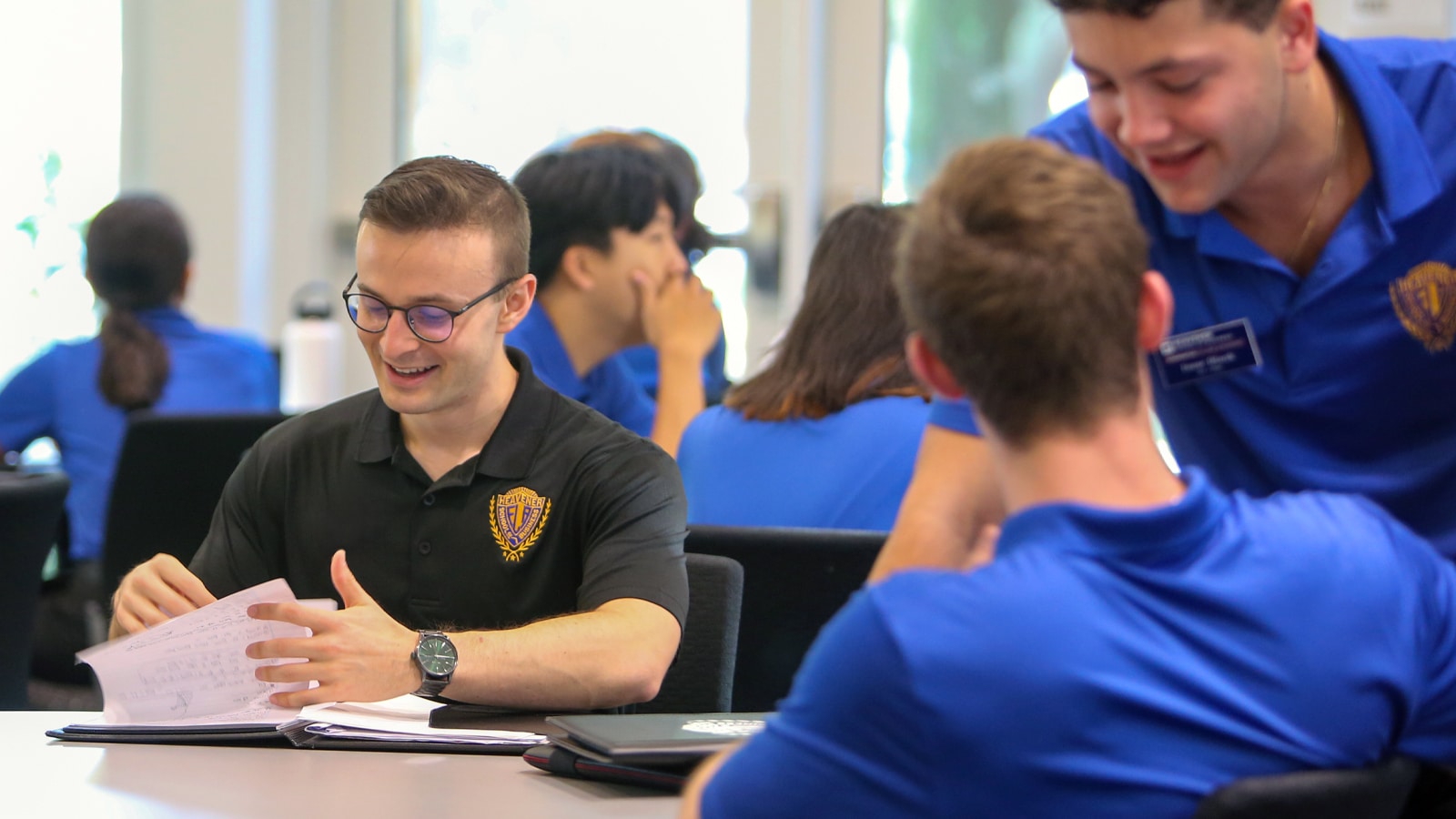
What is the Florida Leadership Academy?
You’ll learn about Emotionally Intelligent Leadership from prominent industry professionals while putting theory into practice through a business case competition as well as community service opportunities.
For 10 Fridays each semester, you’ll join other top sophomores for a three-hour session led by an inspiring professional from a different sector. Assigned a mentor from the previous class, you’ll also develop a peer network — a group to consult with about your personal growth, academic goals, involvement opportunities and career objectives.
After graduating from Florida Leadership Academy, you have the opportunity to return as a mentor or Innovation Committee member in your junior year to further your leadership development while giving back to the next mentee class.
Career development
A strong leader, collaborator, and communicator: Job advertisements nearly always seek these attributes. The Florida Leadership Academy shows you how they build off each other and help you achieve your professional dreams.
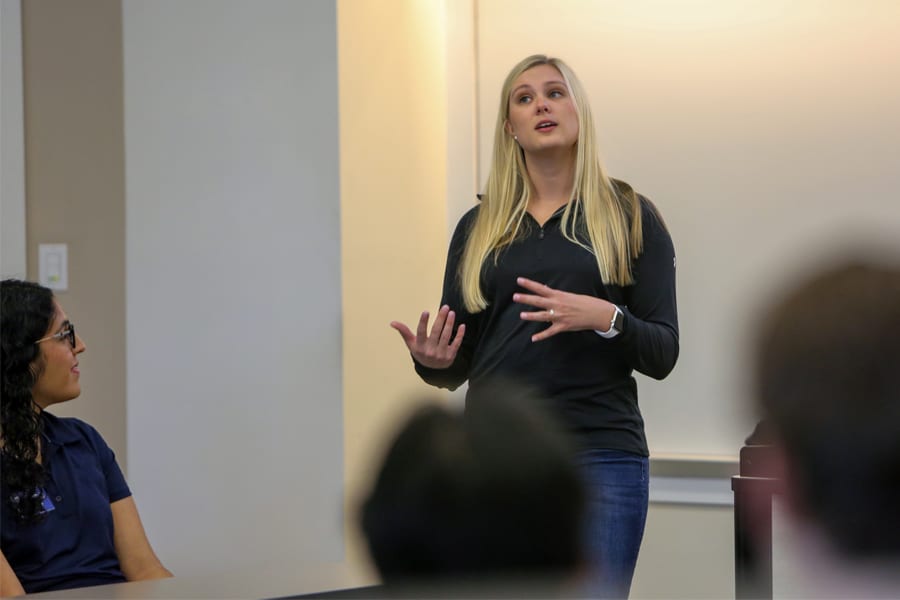
Acquire transferable skills
Progress from initiator to idea-generator and ideal employee. You’ll practice core leadership competencies in hands-on activities integrated into every session and then on campus, around Gainesville, and eventually in your career.
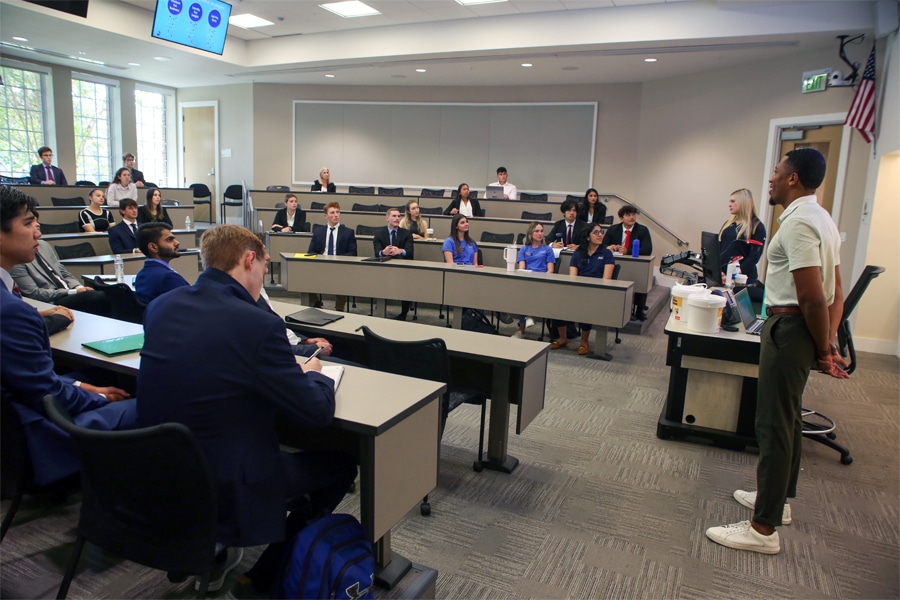
Explore emotionally intelligent leadership
In sessions and with your peer network, you’ll analyze the behaviors of effective leaders and get situation- and industry-specific advice from professionals who steer their respective organizations. These examples give you the framework to gradually assume these qualities yourself.
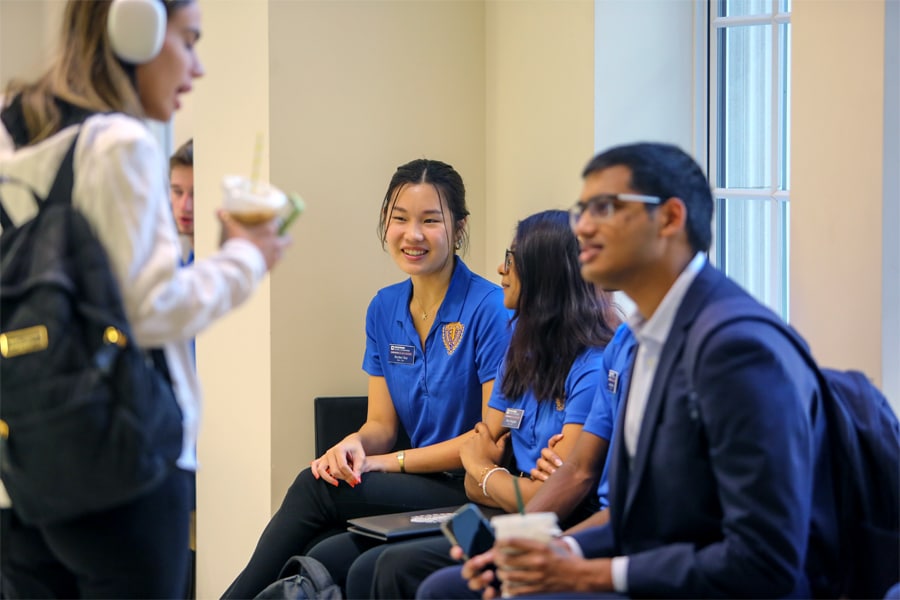
Establish your network
Every leader turns to a mentor — and often acts as a mentor themselves. In addition to meetings with your peer group, Friday sessions include a networking luncheon to connect with visiting speakers, other mentors and mentees, advisory board members, sponsors, and UF alumni.
Professional polish
Professionalism — punctuality, attire, time management, and accountability — is the foundation of leadership and career success. Professional habits develop over time through intentional and consistent practice. The Florida Leadership Academy challenges you to put your best professional food forward each week over the course of one year, helping you become someone others will seek to emulate.
Career readiness
Activities, case competitions, and community involvement allow you to grow as a critical thinker, communicator, and problem solver and understand these skills as pillars of leadership.
Make your plan
Share your dreams and how you intend to achieve them while getting actionable feedback from your peer group and mentor.
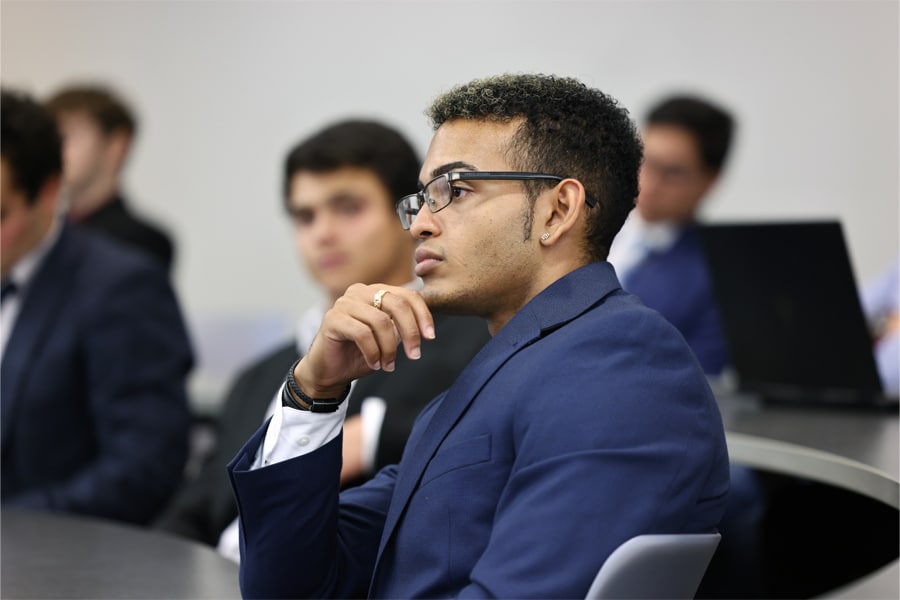
Business ethics
“What’s the significance of this decision?” Leaders in the present routinely ask themselves this question, taking performance, their workforce, their community, and their industry into account.
Create your code of ethics
The standards a leader sets for themselves — honesty, integrity, transparency, and authenticity — become the standard they set for their organization and industry peers. Realizing your own leadership entails defining and adhering to your own values, and you’ll start to do that here.
Put your values into practice
Business simulations and discussions let you take note of how professionals establish their values and how their compass shapes organizational decisions, culture, relationships, and impact.
Civic engagement
Leaders look beyond themselves to lift up and enrich others’ lives. You’ll act upon this ethos as a mentor and by getting involved in the UF and greater Gainesville community.
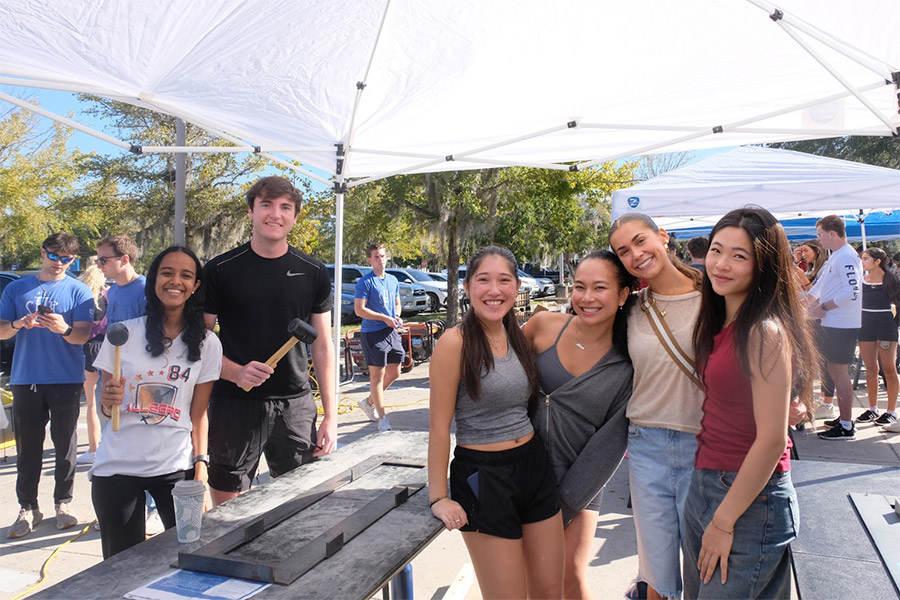
Change maker in progress
The guidance you give encourages others to grow. As you advance in the program, you’ll help your mentees discover who they are as leaders and embrace your passions to spark change — be it on a Florida Leadership Academy committee or through community service.
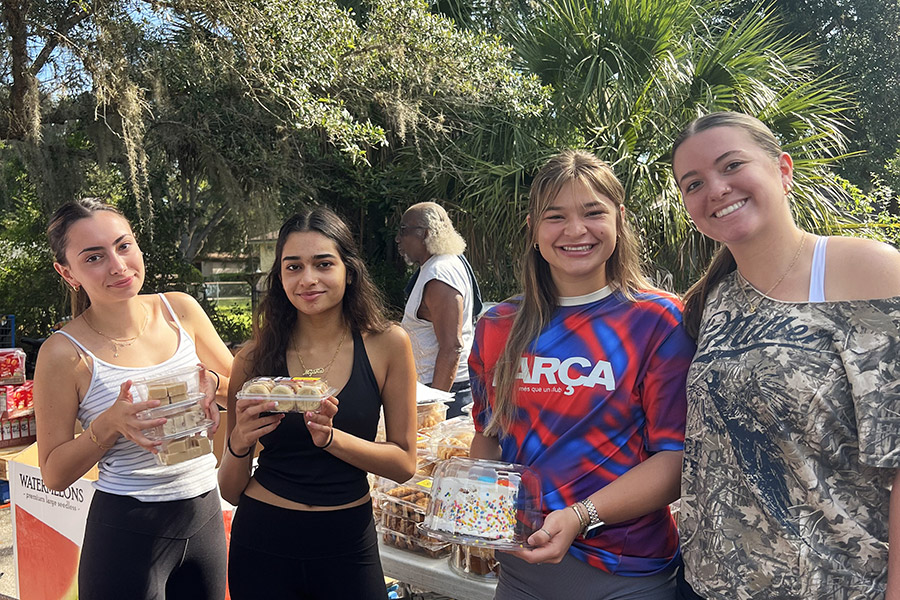
Foundation for corporate responsibility
From creating jobs to conserving resources, businesses deliver a direct benefit to their immediate communities. Championing responsible leadership, the Florida Leadership Academy directs students to empower others on campus and throughout the Gainesville area.

Our partnerships
Florida Leadership Academy students searching for ways to get involved benefit from Warrington’s partnerships with GNV Bridge, GROW HUB and Project Makeover.
Who we are
Take a look at our current leadership pipeline in action! Beginning with our sophomore mentees who get to experience FLA for one academic year with the support of a mentor and fellow mentee group members each semester. After graduating from the program, mentees have the opportunity to strengthen their leadership as mentors or innovation committee members in their junior year. Finally, our members can steer the program’s direction in their senior year as a director or member of our advisory board.
The mentee class is composed of driven second-year students who participate in weekly sessions, attend socials, civic engagements, workshops, and alumni events. Mentees attend Friday sessions with their mentor groups, consisting of four to five mentees and one mentor with whom they will compete in the case competition. Mentees also have the opportunity to apply their leadership skills by serving on a committee.
- Abigail Heimendinger
- Adriana Roth
- Ainsley Miller
- Akshitha Bandam
- Alayna Pearson
- Alexa Perez
- Alexandra Mancuso
- Alexandra Patuel
- Allison Phan
- Amelia Whipple
- Annalia Rodriguez
- Ansley Prather
- August Baier
- Austin Schermer
- Ava Edwards
- Axel March
- Benjamin Cabanas-Miller
- Cailyn Puig
- Caitlin Falkowski
- Caleb D’Antonio
- Carter Hutchinson
- Carter Mui
- Chase Ali
- Ching-Yuan Yao
- Claire Acosta
- Colin Olcott Cott
- Coraline Vaysse
- Daniela Romo de Vivar
- Danielle Swenson
- Devon Brodie
- Divya Duggal
- Ella Papanikolaou
- Ella Gibson
- Emilie Park
- Emma Williams
- Estefania Cerna
- Gabriella Burkett
- Gianna Guerrero
- Grayson Turkaly
- Hallie Goldstein
- Heli Bosmia
- Jack Gilvary
- Jade de Bem Fleury
- Jane Akers
- Janey Jones
- Jenna Perry
- Jeremy Thomas
- Joey Fisher
- Jordan Antevy
- Jose Sepulveda
- Julia Levi
- Katherine Adams
- Kaycie Peppelman
- Landry Kelley
- Lauren deRochemont
- Leah Hoffman
- Lexa Tzelepis
- Lila Evans
- Lilly Shortz
- Lisa Ross
- Lisette Alonso
- Logan Saltzman
- Luke Nevins
- Lydia Zhao
- Mackenzie Quinn
- Madison Hatfield
- Mana Fisher
- Maria Zegarra
- Maria Corina Gonzalez
- Marianna Innocenti
- Matthew Hillman
- Max Kaplan
- Max Sard
- Max Glater
- Maya Kunis
- Maya Richards
- Meghna Kakodker
- Michael Lieberman
- Molly Murphy
- Mysha Khan
- Nicole Gheiler
- Nicole Chen
- Olivia Hughes
- Olivia Martinez
- Pablo Fernandez
- Rahul Karpur
- Riav Gayadin
- Riley Mayforth
- Ryan Bomersbach
- Saakshi Raina
- Sasriya Parsi
- Satya Akula
- Sebastian Lescher
- Sebastian Wright
- Siddharth Kumar
- Sophie Roland
- Stella McLaney
- Tatiana Ronelus
- Taylor Reeves
- Terrence Smith
- Tess Turcu
- Tristan Stavish
- Tyler Tyson
- Vance Schroeder
- Virginia Gilbert
- Zoe Groothuis
Mentors are juniors who graduated FLA and now facilitate the FLA experience for small groups of mentees. Mentors attend weekly sessions with their groups, providing guidance, encouragement, and resources to help them develop personally, academically, and professionally. Mentors also attend socials, civic engagements, alumni events, and workshops. Mentors are eligible to serve as Assistant Directors for one of the four committees, where they assist the respective directors in leading a committee.
- Alyssa Abraham
Civic Engagement AD - Ava Mariani
- Avery Thieman
Administration AD - Cooper Beard
- Enslie Lloyd
Recruitment AD - Jillian Cranney
Recruitment AD - Jordan Birnbaum
Civic Engagement AD - Julia Scarton
- Justin Hall
- Kyle Silvestain
Recruitment AD - Lola Plasencia
Networking AD - Mason Silverstein
Civic Engagement AD - Melissa Garcet
Networking AD - Mell Vigoa Campa
- Michael Iacono
- Raisa Rahman
Global Cultural Intelligence AD - Sophia Caram
Marketing AD - Stephany Arias
- Taylor Aks
The innovation committee is a team of juniors who graduated FLA and now strive to ignite change within the program. Innovation focuses on internal communication and projects that provide all FLA members with opportunities for professional and personal growth during their journey. Innovation projects include the mentee and alumni newsletters, our Microsoft Teams dashboard and directory, the mentor retreat, and workshops.
- Abigail Kloss
Workshops - Alexandra Puig
Leadership Training - Ava LaRocco
Workshops - Chloe Fan
Leadership Training - Derya Caglayan
Newsletters - Ella Zucchero
Corporate Relations - Haley Randolph
Technology Management - Isabella Castagnola-Blaikie
Newsletters - Isobelle Evjen
Intramural Sports - Jacqueline Marks
Book Club - Jaliyah Brown
Leadership Training - Jospeh Gonzalez
Intramural Sports - Monte Grossman
Corporate Relations - Morgan Schneider
Workshops - Nikolas Lima
Book Club - Payton Findlay
Intramural Sports - Priya Patel
Workshops - Roshini Oruganti
Leadership Training - Ryan Moye
Newsletters - Skylar Bons
Newsletters - Sophie Heidt
Technology Management - Tyler Wenczl
Technology Management - Virginia Broughton
Corporate Relations
FLAAB members are graduates of FLA who have given back as mentors or Innovation members during their junior year and now serve as a resource to younger members of the program. FLAAB members share their wisdom and experiences, and some coordinate a project within the program.
- Aaron Lower
Chair of FLAAB - Alexa Sefer
General Member - Blake Goodman
Project Manager of Corporate Relations - Brooke Zaremskas
Project Manager of Intramural Sports - Cecilia Le
General Member - Chloe Lai
Project Manager of Think Tanks - Elizabeth Bond
Project Manager of Warrington Welcome Professional Development Summit - Emma Fariello
General Member - Gabriella Mazza
General Member - Jake Conner
General Member - Jeremy Rich
General Member - Katie Troilo
Project Manager of Insight Sessions - Kennedi Carter
Project Manager of Leadership Training - Laura Mason
General Member - Leah Fisher
Project Manager of Book Club - Mati Diehl
Project Manager of Warrington Welcome Professional Development Summit - Sarah Pagels
General Member - Yoni Mann
Project Manager of Workshops - Zachary Jones
General Member
Directors are graduates of FLA who have given back as mentors or Innovation members during their junior year and selflessly dedicate their senior year to managing major components of FLA’s programming while leading their respective committees.
- Angelina Arguelles
Chief of Staff
Our Chief of Staff oversees all aspects of the program and strives to create an impactful experience for every student in FLA by encouraging members to maximize their growth and leave a positive mark on FLA, Warrington, and UF. - Lin Na Lu
Director of Innovation
Our Director of Innovation spearheads novel projects and resources designed to continuously improve FLA. - Sara Molloy
Director of Networking
Our Director of Networking hosts fun social events that help connect members and build a FLAmily culture, as well as alumni events to foster professional relationships between current and past members of the program. - Angelina Fentress
Director of Marketing
Our Director of Marketing upholds and communicates the FLA brand while supporting all programming through engaging content creation. - Jonah Sacher
Director of Civic Engagement
Our Director of Civic Engagement provides intentional opportunities for members to give back to the local Gainesville community and practice servant leadership. - Mallika Baweja
Director of Recruitment
Our Director of Recruitment strives to attract a diverse class of aspiring leaders by generating awareness of and enthusiasm for FLA through broad outreach and events. - Meghana Reddy
Director of Global Cultural Intelligence
Committees
Make your voice and views heard as you develop key initiatives for and promote the Florida Leadership Academy. Participating in a committee allows you to oversee projects, act on new ideas, and forge important ties with your peers and the program’s leaders.
Please note: Committee recruitment is a selective process within FLA that occurs in the summer after FLA induction. Mentees can apply and interview for a spot on one of four committees.
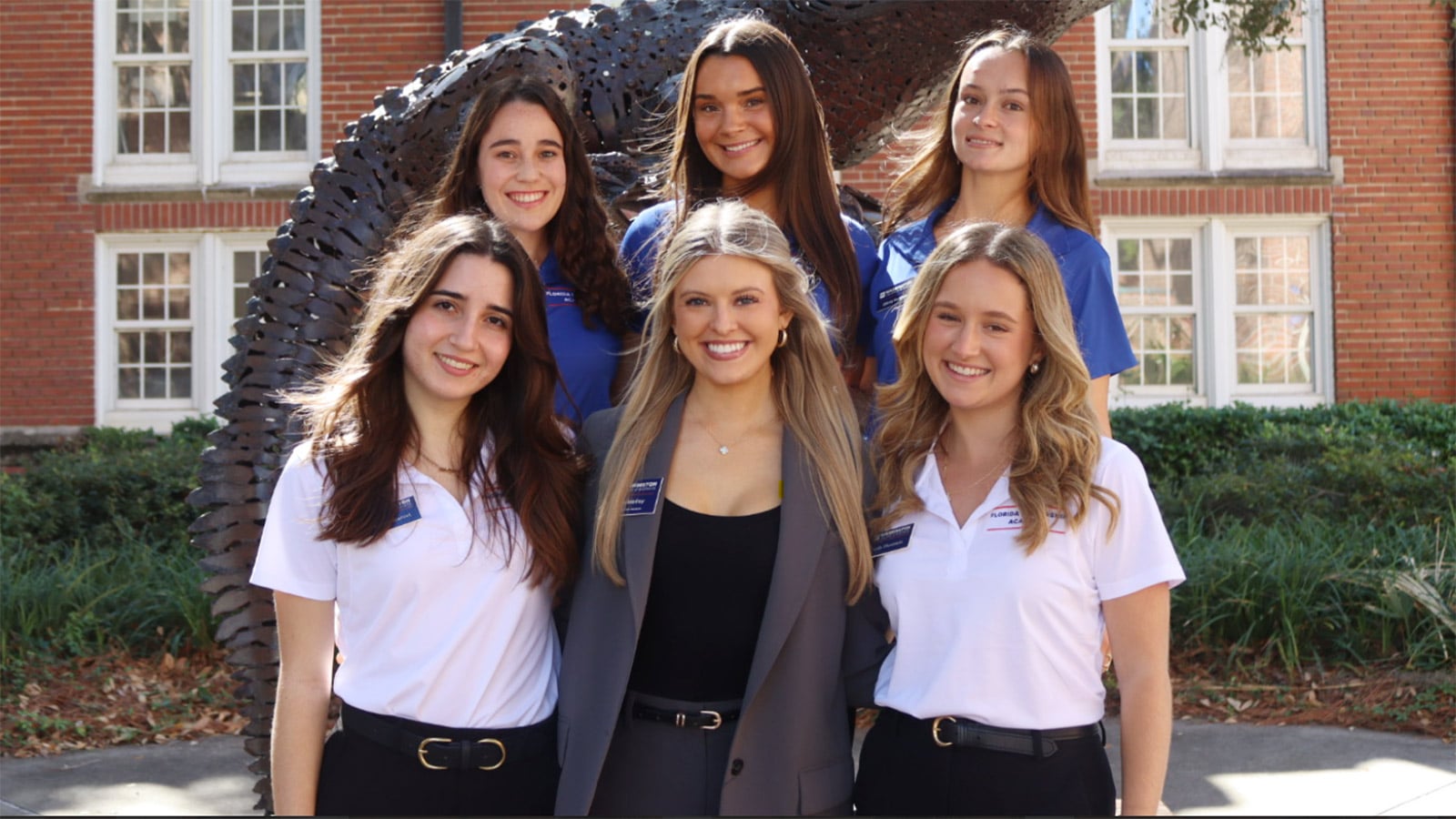
Strengthen the “FLAmily” culture by creating opportunities for current and past members to connect on a personal level. You’ll organize fun and purposeful relationship-building events that bring morning and afternoon session participants together. Plus you will invite and host members of our extensive alumni network on campus to talk about their careers, post-graduation experiences, and the impact of FLA on their journey.
Current members: Sara Molloy, Lola Plasencia, Melissa Garcet, Hallie Goldstein, Amelia Whipple, Olivia Martinez, Olivia Hughes
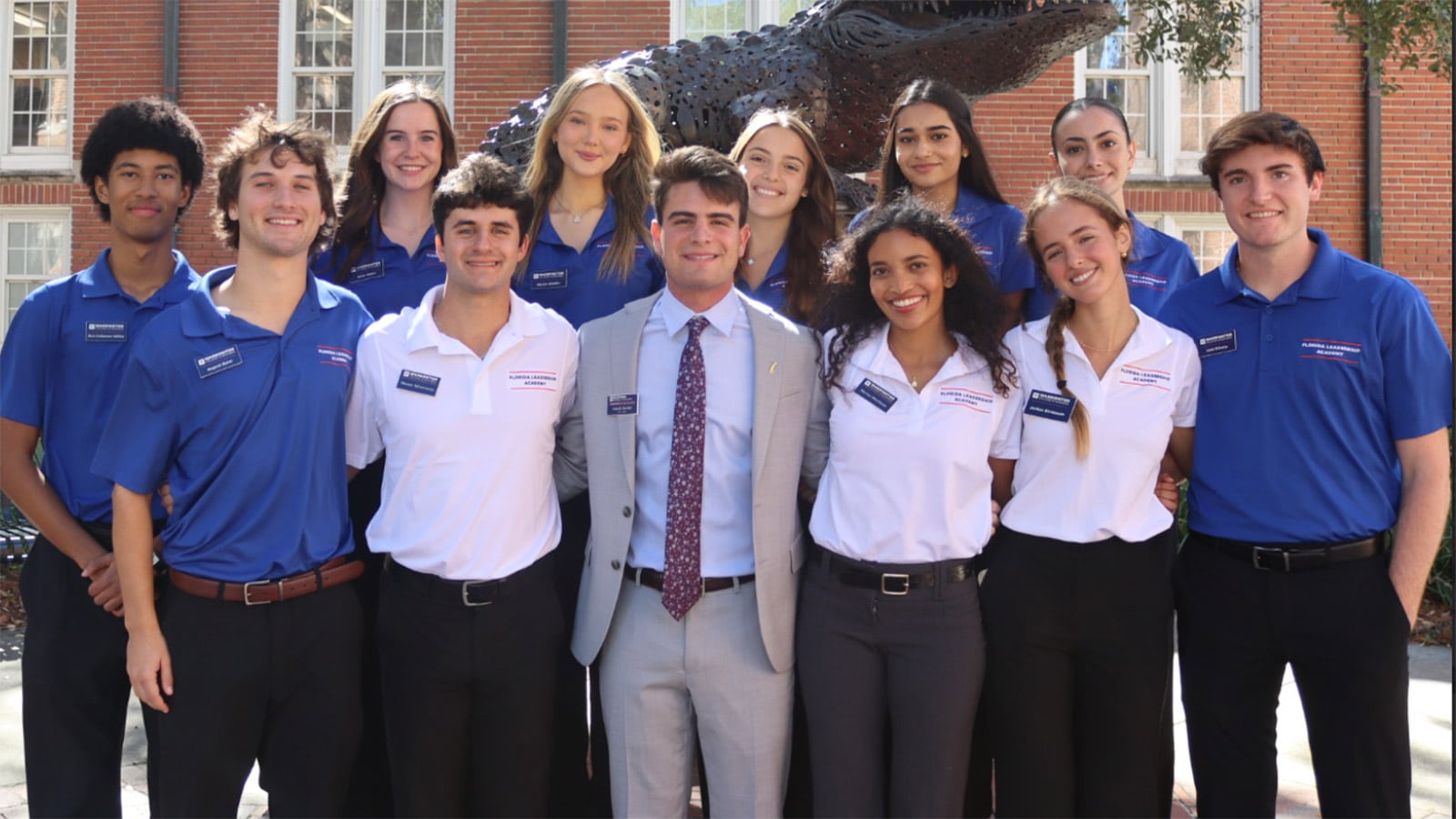
Foster our community partnerships while practicing servant leadership around campus. You’ll manage and strengthen relationships with GROW HUB, GNV Bridge, and other organizations while honing skills in problem-solving, communication, and project management.
Current members: Jonah Sacher, Mason Silverstein, Alyssa Abraham, Jordan Birnbaum, Julia Levi, Benjamin Cabanas-Miller, Mysha Khan, Janie Akers, Kate Adams, Nicole Gheiler, August Baier, Jack Gilvary
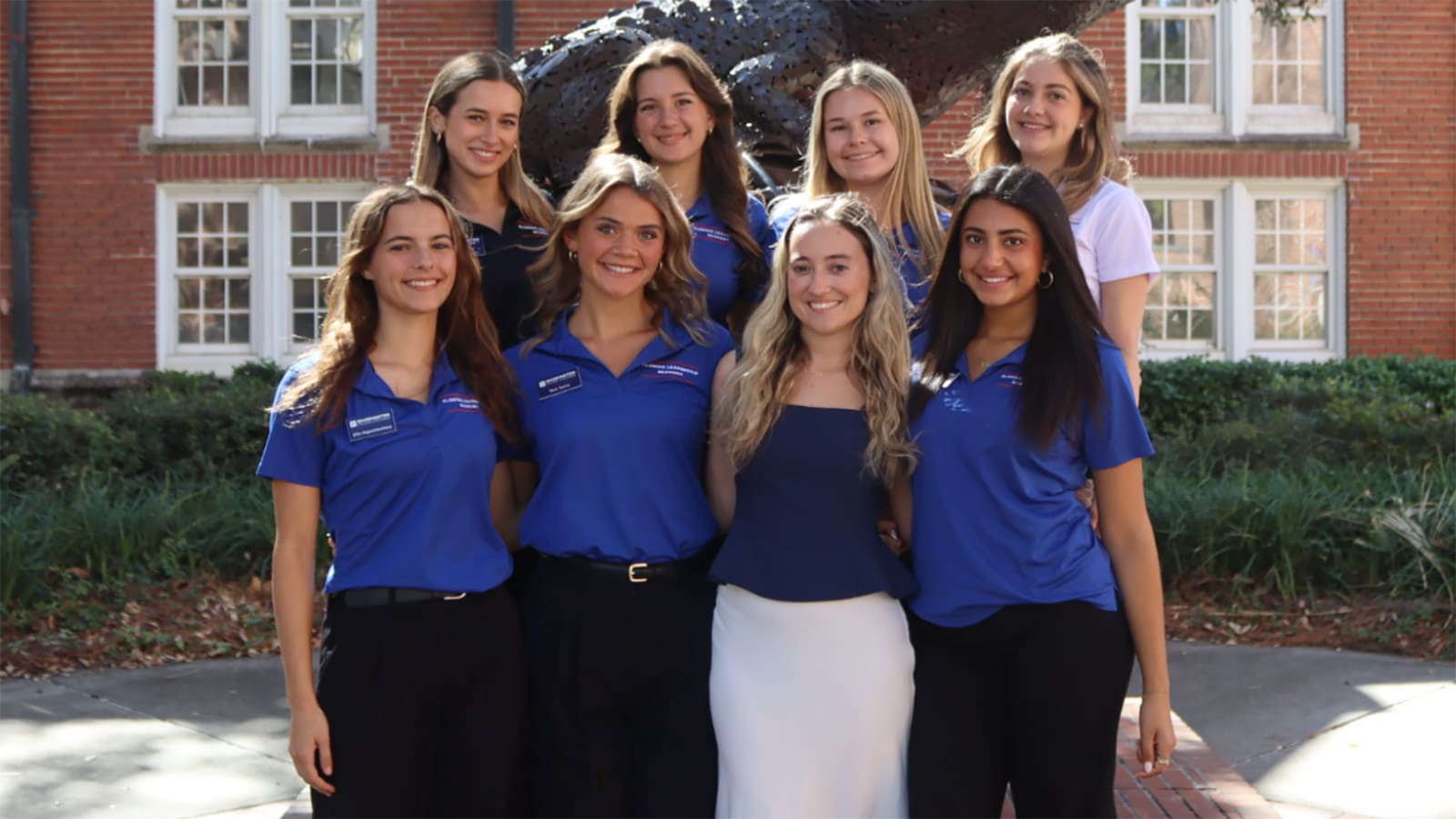
Lead our organization’s promotional strategy by managing our online presence and on-campus image. You’ll creatively document events, manage our social media accounts, develop outreach and promotional content, and design our program’s marketing materials and merchandise.
Current members: Angelina Fentress, Skylar Bons, Sophia Caram, Adriana Roth, Ella Papanikolaou, Kaycie Peppelman, Maya Kunis, Tess Turcu
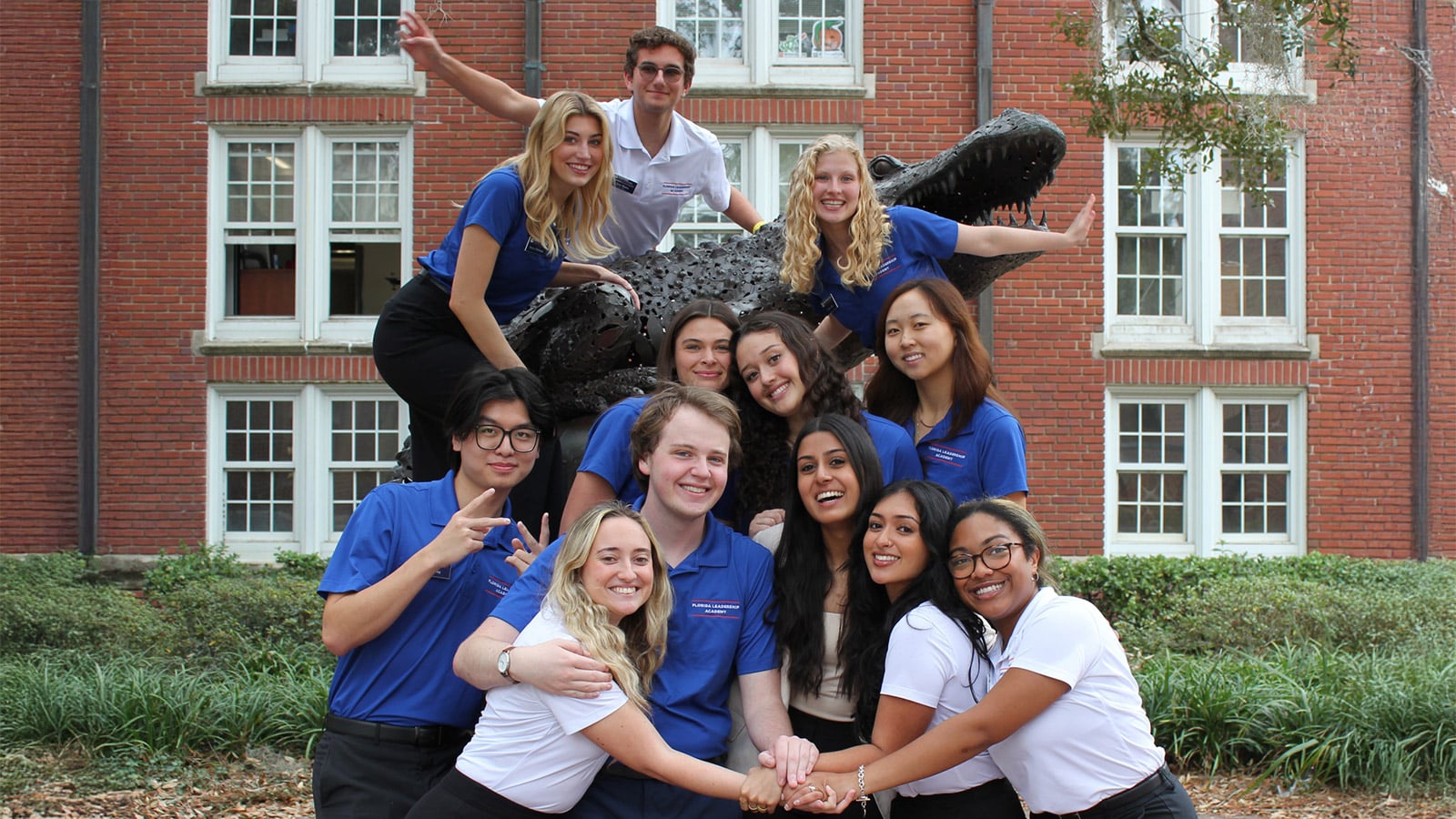
The recruitment committee shapes the future of the Florida Leadership Academy by identifying and engaging the next class of mentees. Members design and lead recruitment events, build outreach strategies, and promote FLA’s brand across campus to attract motivated, high-potential students. The committee also engages the larger Warrington community by orchestrating four major recruitment events, overseeing the spring interview cycle, and connecting with prospective participants.
Current members: Mallika Baweja, Enslie Lloyd, Jillian Cranney, Kyle Silvestain, Sebastian Lescher, Nicole Chen, Siddharth Kumar, Sophie Roland, Landry Kelley, Ryan Bomersbach
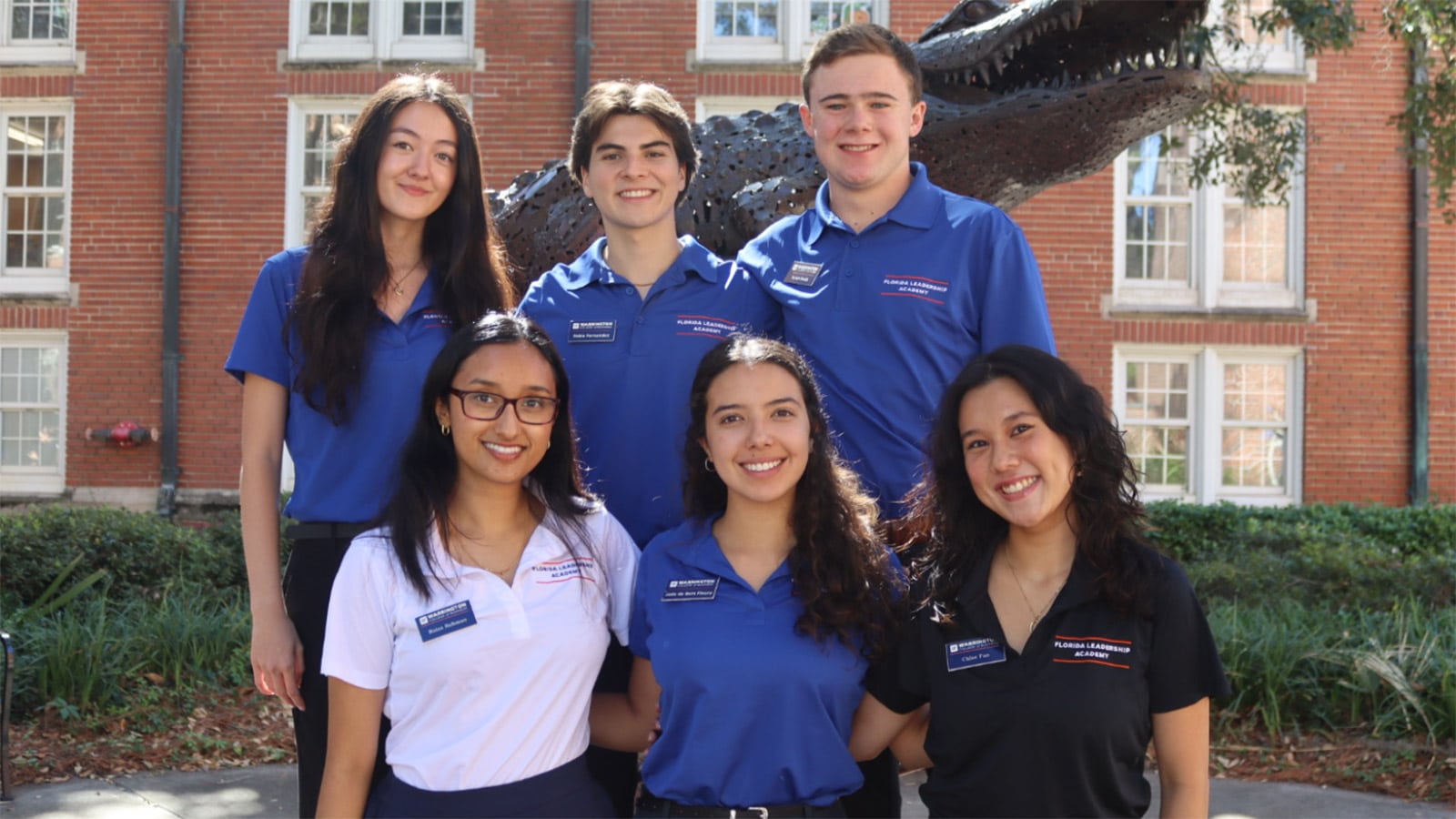
The global and cultural intelligence (GCI) committee helps FLA members develop into thoughtful, globally minded leaders that employers seek to hire by building cultural awareness, adaptability, and empathy. Global and cultural intelligence is the ability to engage individuals from diverse cultural and social backgrounds by understanding different norms and practices and navigating intercultural environments with sensitivity and respect. This committee brings a global perspective to everything that happens in FLA and works to build an organization where all members feel connected to the wider world.
Current members: Meghana Reddy, Raisa Rahman, Chloe Fan, Terrence Smith, Jack de Bem Fleury, Pablo Fernandez Montoya
What is emotionally intelligent leadership?
FLA uses principles from the Emotionally Intelligent Leadership model developed by Marcy Levy Shankman, Scott J. Allen, and Paige Haber-Curran. EIL consists of three overarching facets and 19 capacities that equip individuals with the knowledge, skills, perspectives and attitudes to achieve desired leadership outcomes.
Emotional self-perception: Identifying emotions and their influence on behavior. Emotional self-perception is about describing, naming and understanding your emotions. Emotionally intelligent leaders are aware of how situations influence emotions and how emotions affect interactions with others.
Emotional self-control: Consciously moderating emotions. Emotional self-control means intentionally managing your emotions and understanding how and when to demonstrate them appropriately. Emotionally intelligent leaders take responsibility for regulating their emotions and are not victims of them.
Authenticity: Being transparent and trustworthy. Authenticity is about developing credibility, being transparent and aligning words with actions. Emotionally intelligent leaders live their values and present themselves and their motives in an open and honest manner.
Healthy self-esteem: Having a balanced sense of self. Healthy self-esteem is about balancing confidence in your abilities with humility. Emotionally intelligent leaders are resilient and remain confident when faced with setbacks and challenges.
Flexibility: Being open and adaptive to change. Flexibility is about adapting your approach and style based on changing circumstances. Emotionally intelligent leaders seek input and feedback from others and adjust accordingly.
Optimism: Having a positive outlook. Optimism is about setting a positive tone for the future. Emotionally intelligent leaders use optimism to foster hope and generate energy.
Initiative: Taking action. Initiative means being a self-starter and being motivated to take the first step. Emotionally intelligent leaders are ready to take action, demonstrate interest, and capitalize on opportunities.
Achievement: Striving for excellence. Achievement is about setting high personal standards and getting results. Emotionally intelligent leaders strive to improve and are motivated by an internal drive to succeed.
Displaying empathy: Being emotionally in tune with others. Empathy is about perceiving and addressing the emotions of others. Emotionally intelligent leaders place a high value on the feelings of others and respond to their emotional cues.
Inspiring others: Energizing individuals and groups. Inspiration occurs when people are excited about a better future. Emotionally intelligent leaders foster feelings of enthusiasm and commitment to the organizational mission, vision, and goals.
Coaching others: Enhancing the skills and abilities of others. Coaching is about helping others enhance their skills, talents, and abilities. Emotionally intelligent leaders know they cannot do everything themselves and create opportunities for others to develop.
Capitalizing on difference: Benefitting from multiple perspectives. Capitalizing on difference means recognizing that our unique identities, perspectives, and experiences are assets, not barriers. Emotionally intelligent leaders appreciate and use difference as an opportunity to create a broader perspective.
Developing relationships: Building a network of trusting relationships. Developing relationships means creating meaningful connections. Emotionally intelligent leaders encourage opportunities for relationships to grow and develop.
Building teams: Working with others to accomplish a shared purpose. Building teams is about effectively communicating, creating a shared purpose, and clarifying roles to get results. Emotionally intelligent leaders foster group cohesion and develop a sense of “we.”
Demonstrating citizenship: Fulfilling responsibilities to the group. Citizenship is about being actively engaged and following through on your commitments. Emotionally intelligent leaders meet their ethical and moral obligations for the benefit of others and the larger purpose.
Managing conflict: Identifying and resolving conflict. Managing conflict is about working through differences to facilitate the group process. Emotionally intelligent leaders skillfully and confidently address conflicts to find the best solution.
Facilitating change: Working toward new directions. Facilitating change is about advancing ideas and initiatives through innovation and creativity. Emotionally intelligent leaders seek to improve on the status quo and mobilize others toward a better future.
Analyzing the group: Interpreting group dynamics. Analyzing the group is about recognizing that values, rules, rituals, and internal politics play a role in every group. Emotionally intelligent leaders know how to diagnose, interpret, and address these dynamics.
Assessing the environment: Interpreting external forces and trends. Assessing the environment is about recognizing the social, cultural, economic, and political forces that influence leadership. Emotionally intelligent leaders use their awareness of the external environment to lead effectively.
How to apply
Leaders don’t just emerge — they’re cultivated, refining their approach one experience at a time. Applying to the Florida Leadership Academy lets you embark on this pursuit now, so you graduate with a strong, workforce-ready leadership foundation.
FLA is a transformational program that requires a significant investment of time and energy. Selected mentees must be able to commit an average of five hours per week in their Fall and Spring semesters.
- Attend 10 engaging Friday sessions and lunches each semester (three hours per week).
- Meet individually with your mentor, our program director, and FLAAB members.
- Participate in one Social and one Civic Engagement event each semester.
- Participate in one Workshop and one Alumni Event in separate semesters.
- Apply developed leadership and professional skills in a Fall case competition.
- Attend our Spring Graduation and Induction Ceremony.
Applicants must meet all listed eligibility criteria by the date and time applications close. Applications that fail to meet one or more criteria will not be forwarded to the selection committee for review. By submitting an application, applicants agree to release their academic records and discipline records to the selection committee.
- 3.0 UF GPA
- Business or accounting major
- Entering sophomore year upon application
- Be on campus for the Fall and Spring semesters of your sophomore year
Each eligible applicant will be reviewed and scored by a selection committee consisting of Heavener staff members and FLA Advisory Board members. This criteria will be used to score applicants:
- Academic excellence
- Demonstrated leadership initiative
- Commitment to personal and professional development
- Compelling and professional application materials
Applications for FLA Class XXIII open on January 13, 2026 and close on February 17th at noon. If you have further questions regarding the application process after reviewing the following, please reach out to Mallika, our Director of Recruitment.
In this application, you will be asked to upload a screenshot of your resume in VMock, with required elements showing. Follow the VMock instructions now so your screenshot will be ready for uploading.
Applications open January 13th.
VMock instructions for the FLA application
Use your Warrington VMock account to build your most compelling resume (yellow zone or a minimum score of 33 required) and then upload one screenshot that includes all of these items:
- Your name at the top right of your student dashboard
- Your resume score
- Your entire resume visible
- Your name on your resume
If any of these elements are missing from your screenshot, your application will be incomplete.
Getting your VMock resume score
- Go to the VMock Warrington login and sign in using your GatorLink credentials. You have access to 10 free VMock submissions per year, so we encourage you to only score your resume when you have made all suggested edits.
- In your VMock Dashboard, select “Resume” and “Resume Feedback.” Then choose the category that best fits your current resume status:
- Category 1: You already have an existing resume.
- Option A: Your existing resume was built using an approved Warrington Resume Template (Year One Resume Template or Warrington Resume Template) (option A video tutorial).
- Upload your resume in PDF format to get started. VMock will automatically start scoring your resume.
- Follow the step-by-step SMART Editor guidance.
- Option B: Your existing resume was not built using an approved Warrington Resume Template (Year One Resume Template or Warrington Resume Template). Pick one of the two methods listed next to upload your resume and convert it to an approved template, based on how much time, effort, and scoring attempts you prefer to use.
- Method B1: Using this method will save you time by automating, but be aware that it uses a minimum of two VMock attempts (method B1 video tutorial):
- Upload your resume to VMock in PDF format to get started.
- VMock will give your resume an initial score. Click on “SMART Editor.”
- The screen will prompt you to select a resume template. Select the “Year One and Two – Undergraduate” template. Your resume will convert to this template.
- Follow the step-by-step SMART Editor guidance.
- Method B2: Using this method is more time-intensive and manual, but uses a minimum of 1 VMock attempt (method B2 video tutorial):
- Under “Community Templates,” select “See All Templates.”
- Select the “Year One and Two – Undergraduate Template.”
- Select “Download Template.”
- Click on the downloaded Template, and use it as a reference to convert your resume to the correct format. Ensure the margins, font, headers, layout, and content use the same format as the template.
- Once you have manually converted your resume to the correct format, upload your resume to VMock in PDF form.
- Follow the step-by-step SMART Editor guidance.
- Method B1: Using this method will save you time by automating, but be aware that it uses a minimum of two VMock attempts (method B1 video tutorial):
- Option A: Your existing resume was built using an approved Warrington Resume Template (Year One Resume Template or Warrington Resume Template) (option A video tutorial).
- Category 2: You do not have an existing resume. Create a Resume using VMock (category 2 video tutorial):
- If you do not have a resume yet, click on the “Create New” button in your student dashboard.
- A resume template will appear on the screen. Click the small piece of paper icon under SMART Editor, and select “New Resume.”
- Select the template titled “Year One and Two – Undergraduate.”
- Start adding content and follow the SMART Assistant for step-by-step guidance and real-time feedback.
- Once you have added sufficient content, click Get Score to receive your resume score and feedback.
- Category 1: You already have an existing resume.
- Make desired edits and incorporate all feedback, and then rescore your resume until you are satisfied with your score. Remember that your scoring attempts are limited to 10 per year, so only resubmit your resume for scoring once all of your recommended edits have been made. If you are in the red zone, you will need to keep working on your resume until you receive a score in the yellow zone (33 or higher).
- Once you are happy with your resume score and your resume is in the proper Warrington format, you will need to take a screenshot to submit for FLA.
- Select “Student Dashboard” to go back to the home screen, and then select “Resume” to return to all resume attempts.
- Find the attempt that you would like to submit, and select “View Detailed Feedback.”
- Zoom out on your browser so your entire resume is visible on your screen.
- Take the exact screenshot provided as an example below, which must include all of these elements. Missing any of these elements will render your application incomplete.
- Your name in the gray box of your VMock Dashboard
- Your name at the top of your resume
- Your VMock score
- Your entire resume should be visible
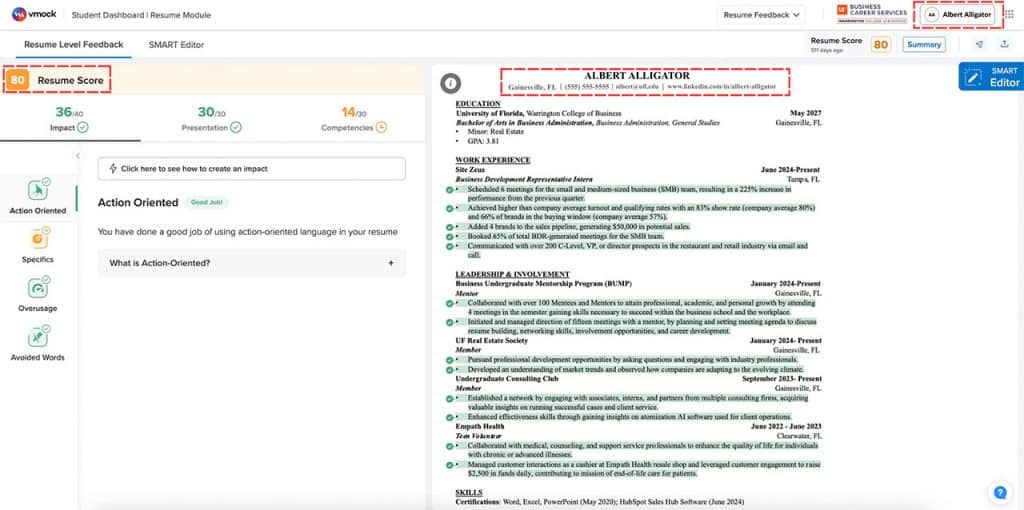
Meaningful experiences

“You may have joined FLA for the professional development and opportunities it offers — but it’s the people who will make every bit of your time and commitment truly worth it. The friends, supporters, and mentors you meet will be in your corner for life. They’ll push you to grow and remind you of your ‘why’ when things get tough.”
Angelina Fentress (BSAc ‘26)
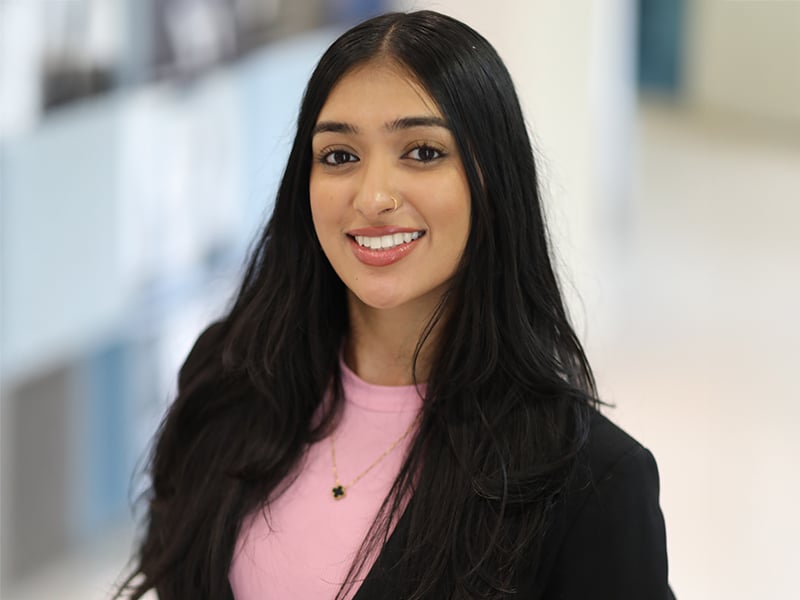
“Step out of your comfort zone! Be comfortable with the uncomfortable — because that’s truly how you grow. Take initiative, put yourself out there, and don’t be afraid to start conversations. Network and build friendships with every level of FLA; everyone genuinely wants to meet you and be there for you.”
Mallika Baweja (BSBA ‘26)
Upcoming recruitment events
Attend our upcoming events to get to know the FLAmily while learning more about FLA and the application process!
If you have further questions, please visit our recruitment office hours in HVNR 160 during the following dates and times:
- February 4th 1-4 PM
- February 5th 1-4 PM
- February 11th 1-4 PM
- February 12th 1-4 PM

Contact us
Lisa D’Souza
Program Director & Advisor
Director, Leadership & Experiential Programs
352-273-0165
Email Lisa